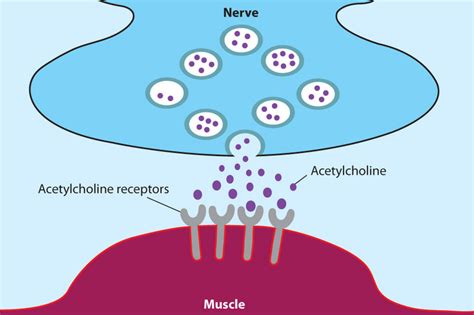Definition:

Acetylcholine (ACh) is a neurotransmitter responsible for the transmission of nerve impulses across synaptic clefts, the gaps between neurons. It is the most abundant neurotransmitter in the nervous system and plays a crucial role in a wide range of cognitive and physical processes.
Function:
Acetylcholine is involved in a plethora of functions, including:
- Memory and Learning: It enhances memory formation and facilitates learning by promoting neuronal plasticity.
- Muscle Contraction: It stimulates muscle contraction, allowing for movement and skeletal activity.
- Autonomic Nervous System: It regulates the functions of the autonomic nervous system, controlling heart rate, blood pressure, and digestion.
- Arousal and Attention: Acetylcholine is vital for maintaining alertness, attention, and general arousal levels.
- Neurogenesis: Research indicates that ACh may promote neurogenesis, the creation of new neurons in the brain.
Cholinergic Neurons:
Acetylcholine is synthesized and released by specialized neurons called cholinergic neurons. The basal forebrain, particularly the nucleus basalis of Meynert, and the tegmentum are the primary sources of cholinergic projections in the brain.
Mechanism of Action:
Acetylcholine binds to specific receptors on the postsynaptic neuron. These receptors are categorized into two main types:
- Nicotinic Receptors: These receptors are ionotropic, meaning they allow sodium ions to enter the postsynaptic cell, resulting in depolarization.
- Muscarinic Receptors: These receptors are metabotropic, meaning they activate G proteins that trigger downstream signaling pathways.
Clinical Significance:
Acetylcholine deficiency or dysfunction is implicated in several neurological disorders:
- Alzheimer’s Disease: A decline in cholinergic function is a hallmark of Alzheimer’s disease, leading to impaired memory and cognitive decline.
- Myasthenia Gravis: An autoimmune disorder characterized by the destruction of acetylcholine receptors at the neuromuscular junction, resulting in muscle weakness.
- Parkinson’s Disease: ACh deficiency in specific brain regions contributes to the motor symptoms of Parkinson’s disease.
Pharmacology:
Drugs that modulate cholinergic activity are widely used in medicine:
- Cholinergic Agonists: These drugs mimic the effects of acetylcholine, such as muscarine and pilocarpine for treating glaucoma.
- Cholinergic Antagonists: These drugs block the actions of acetylcholine, such as atropine for treating motion sickness.
New Applications:
Emerging research has explored the potential of modulating cholinergic activity in novel therapeutic applications:
- Neuroprotection: Acetylcholine may protect neurons from damage in conditions such as stroke and traumatic brain injury.
- Neuroplasticity Enhancement: Cholinergic stimulation could enhance neuroplasticity, potentially beneficial for treating depression and cognitive disorders.
- Targeted Drug Delivery: By engineering drugs to target cholinergic receptors, researchers aim to improve drug efficacy and minimize side effects.
Table 1: Cholinergic Functions
| Function | Description |
|---|---|
| Memory and Learning | Facilitates encoding, storage, and retrieval |
| Muscle Contraction | Initiates skeletal muscle movement |
| Autonomic Nervous System | Regulates heart rate, blood pressure, and digestion |
| Arousal and Attention | Enhances alertness and focus |
| Neurogenesis | Promotes the creation of new neurons |
Table 2: Cholinergic Receptors
| Receptor Type | Location | Mechanism |
|---|---|---|
| Nicotinic | Postsynaptic membrane | Ionotropic, allows sodium influx |
| Muscarinic | Postsynaptic membrane | Metabotropic, activates G proteins |
Table 3: Pharmacological Modulation of Acetylcholine
| Drug Type | Effect | Clinical Use |
|---|---|---|
| Cholinergic Agonists | Mimic ACh effects | Glaucoma, bradycardia |
| Cholinergic Antagonists | Block ACh effects | Motion sickness, anticholinergic delirium |
Table 4: Emerging Applications of Acetylcholine
| Application | Research Focus |
|---|---|
| Neuroprotection | Protecting neurons from damage |
| Neuroplasticity Enhancement | Improving cognitive function |
| Targeted Drug Delivery | Enhancing drug efficacy and minimizing side effects |
- Enhance Cholinergic Activity Naturally: Engage in activities that stimulate the cholinergic system, such as exercise, mental challenges, and social interaction.
- Consider Cholinergic Supplementation: Discuss with a healthcare professional about potential benefits and risks of acetylcholine supplements.
- Manage Stress: Chronic stress can impair cholinergic function. Practice stress management techniques like meditation or yoga.
- Oversimplifying Cholinergic Function: Acetylcholine plays a multifaceted role, and its effects vary depending on the brain region and receptor subtype involved.
- Assuming Acetylcholine is Always Beneficial: While acetylcholine is generally important for cognitive function, excessive or dysregulated cholinergic activity can lead to negative consequences.
- Confusing Acetylcholine with Dopamine: Acetylcholine and dopamine are distinct neurotransmitters with different functions and mechanisms of action.
- What is the role of acetylcholine in memory? ACh facilitates the formation and retrieval of memories by influencing neuronal plasticity.
- How does acetylcholine affect muscle contraction? ACh stimulates muscle contraction by binding to receptors at the neuromuscular junction.
- What are the symptoms of acetylcholine deficiency? Cognitive decline, muscle weakness, and autonomic dysfunction can result from ACh deficiency.
- What is the relationship between acetylcholine and Alzheimer’s disease? Impaired cholinergic function is a key characteristic of Alzheimer’s disease, contributing to memory loss and cognitive decline.
- Are there any natural ways to increase acetylcholine levels? Yes, exercise, mental stimulation, and social interaction promote cholinergic activity.
- Can I take acetylcholine supplements? Discuss with a healthcare professional before supplementing with acetylcholine, as it may not be suitable for everyone.
- How does stress affect acetylcholine? Chronic stress can decrease cholinergic function, leading to cognitive and physical impairments.
- What are the differences between nicotinic and muscarinic receptors? Nicotinic receptors are ionotropic and allow sodium influx, while muscarinic receptors are metabotropic and activate G proteins.
